“The current situation is another reminder of why I went into pediatrics: to devote my life to promoting the health of children, empowering the younger generation to be all that they were made to be, and building the family, no matter the circumstances.”
Dr. Shirley González, “Pediatrician relishes connecting with her patients in new ways” on March 24, 2020, Boston Globe Letters
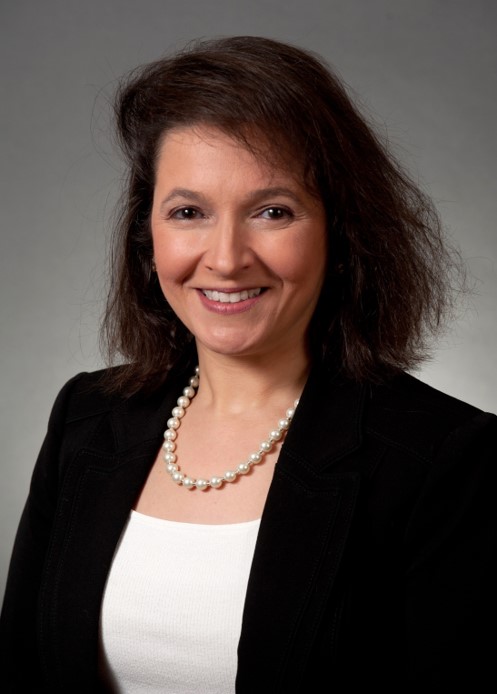
We sat down to talk with PPOC Pediatrician Dr. Shirley González of Newton Pediatrics in Wellesley to find out about her extensive research and programming surrounding childhood obesity. What we discovered was that Dr. González has fostered a lifelong love of learning, and in 2002, she sought to start a clinical program that would include an element of continuous evaluation; a program that could be effective in different areas, and then change direction if needed. She noticed a gap at that point in time, in obesity studies which lasted more than 3 to 6 months, and which incorporated socioeconomically and ethnically diverse children and their families.
“An endocrinologist at the Joslin Diabetes Center as well as a family medicine doctor, both helped motivate me to study obesity,” said Dr. González. “In 2002-2003, very few people in academia were talking about obesity as a real problem. I was starting to see it in my office, and I wanted to destigmatize it. I wanted to attack it from a different angle. I love the field of endocrinology, and I wanted to prevent Type 2 diabetes.”
The project she began would incorporate families for at least 12 months, and would become a change agent for patients and families throughout her community. What has come out of this initial interest is several projects/studies, not only enabling Dr. González to touch numerous families with education surrounding nutrition, physical activity, and positive behaviors, but an equally impressive education for the medical, graduate, and physician assistant students who pass through her practice.
Dr. González started the Teen, Empowerment, Exercise, Education, Nutrition (TEEEN®) Program in 2003, with the goal of addressing pediatric obesity using a different venue than the clinical setting. This family-based program uses social cognitive theory and modeling theory together with play-based learning to encourage clinically obese or at-risk pediatric patients to become active, to learn different ways to exercise, to learn nutritious ways to cook, and to help them feel empowered to become leaders to practice these skills in other settings. “The kids would come once a month for four hours in person, and we would monitor their behavior through motivational interviewing. We incorporated physical activity, cooking projects, and interactive educational games” said Dr. González. The program involves not only the patients and their parents, but medical, physician assistant, and graduate students who come to learn about inter-professional education and to obtain community service hours. Several of these students are interested in pediatrics as well as in addressing social determinants of health. Medical students and physician assistant students may spend their four years and two years of school, respectively, helping with this program. “They love the community setting we have for this work and research, and it’s a great place for the students to get support from each other,” reflected Dr. González.
Through the TEEEN® program, parents are fully engaged and learn the appropriate behavior to model for their children. Many parents, who have addressed the lack of time, the cost of food, the lack of education around what is or isn’t healthy, are brought directly into group sessions to learn alongside the kids. “When approached about participation in this program, the majority of parents are motivated to do something to help fight obesity and the co-morbidities that come from it such as Type 2 diabetes and non-alcoholic fatty liver disease,” said Dr. González. “We have observed peer-to-peer education among children as well as among parents. In addition, we have noticed that parents as well as children act as agents of change.”
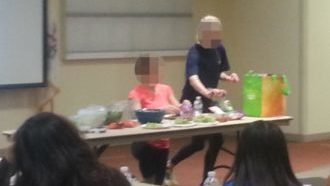
She aims to reach out to patients within the 8-12 age group because of their willingness to alter or change behaviors which may be harming them. To qualify, patients must have a BMI% ≥ 85%. Depending on the year, the program has anywhere from 20 to 25 participants. Parents are invited to participate in physical activity components, didactic events, and presentations; learning, as they join, to feel empowered to be helpful resources to their families. “The role-modeling becomes fun for the parents, and they like working with the medical, graduate and PA students. The bonding that takes place is a venue to reach the parents and communicate what they need to hear in a culturally component way,” said Dr. González. “For example, how can you buy healthy food and stay within your budget, and how can you cook nutritious food using the flavors from your culture?”
This program has enabled Dr. González and her team of rotating students to complete multiple studies including:
- The effectiveness of the program on lowering BMI; the results of which showed that the percent of children who lost BMI was 75% in the intervention group as compared to only 23% in the control group, a difference that was statistically significant.
- The effectiveness of the program on nutrition facts label knowledge acquisition: If children received the education, they scored higher on the nutrition facts label knowledge test.
- The effectiveness of the program on health-related quality of life (HRQOL); They had seen empowerment, avoidance of risky behaviors, and the assumption of leadership positions. In order to quantify that, they used a validated questionnaire (PedsQL™). In the intervention group, changes in scores in the categories of physical, psychosocial and total were consistently clinicallysignificant, (i.e., higher than the MCID-Minimal Clinically Important Differences), changes in scores were always more than the change in scores in the control group and the control group never experienced a change higher than the MCID.
- The effect of the program on parental nutritional and physical activity patterns—resulting in statistically significant changes in parental behaviors including portion sizing and reading nutrition fact labels, as well as walking. They also saw a decrease in children’s BMI%, which correlated with parental attendance.
- A feasibility study on the use of Accelerometers in the overweight pediatric population, citing initial technological hurdles and the finding of walking as the most common type of physical activity. Children wear the Accelerometer and collect data at the point when the activity is happening. Similar to the use of glucose monitors, it measures how active kids are each day when they are participating in physical activity.
- Motivational interview study, which used a validated motivational interview tool (FNPA), to document obesogenic behaviors (i.e., screen time, soda and fast food consumptions), and looked at change in score with respect to improvements in the areas of nutrition and physical activity as well as, change in BMI% and BMI z score. Change in score and change in BMI% and z score were statistically significant.
- Medical and graduate student education: Looking at the students’ knowledge acquisition in the area of pediatric obesity, studying the science learning and teaching.
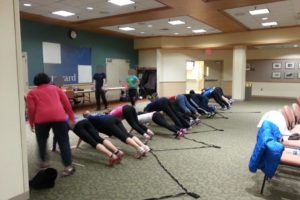
The studies, presented at meetings such as the Pediatric Academic Societies Meeting and the Obesity Society meeting, have indicated that participants who come to the program for one year (minimum of four sessions) demonstrate the best results. Sometimes the children who participated in the program as younger teens continue participating after their initial year has ended, helping as leaders for subsequent participants.
Primary Care During a Pandemic
In 2020, Dr. González worried the onset of COVID-19 meant the team wouldn’t be able to facilitate the TEEEN® program in-person anymore. The surge of COVID-19 cases disabled providers from seeing their patients in the office. Within a matter of days, providers had to train themselves on telehealth procedures, and train their patients on how to use MyChart and Zoom. “I still remember the joy I felt when I saw my first patient using telemedicine. He was having an asthma exacerbation and really needed guidance,” said Dr. González. “As I was trying to find articles on the history of medicine to see how they listened to heart and lungs sounds prior to the advent of the stethoscope, the mom quickly told me she was studying to become a medical assistant and had a stethoscope. Listening first to her normal lung sounds, she then identified the lung sounds in her child. The use of telemedicine was a source of immense gratification.”
While she transitioned patient care to telemedicine, she also used telehealth and virtual meetings to facilitate her teaching of medical students and formatted the TEEEN® program to enable virtual participation for the program’s current 25 participants.
“Now, during the pandemic, it’s all virtual, and we do things we can’t do in person. More parents can join the virtual meetings, and children younger than 8 can come. We conduct Zumba sessions; we are trying to put together a virtual choir, we do art projects, we talk about professionalism, saving money, how to give oral presentations, and how to be a leader.”
Studying the Students – The Science of Education and Learning
She has taken a particular interest in educating medical, graduate and PA students through the TEEEN® program as well, and felt it important to continue this work through the pandemic with telemedicine education. As most of her patients were used to seeing medical students when they came for in-person appointments with her, she continued to have them attend virtually for telehealth visits. In turn, her students have seen how telemedicine can provide a venue for addressing population health topics like obesity and asthma as they can view aspects of patients’ daily lives. With patients in their own homes, the providers are able to see what foods are in refrigerators and pantries, conduct on-the-spot nutrition facts label education, and see how much order is in the home—aspects that may not be possible with an office visit.
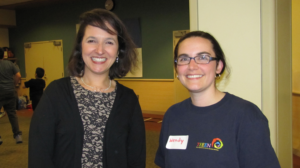
“Telemedicine has helped me connect with my patients and they have appreciated seeing their provider, as many have felt isolated. It has been great to provide my students a hands-on experience of what we as physicians have gone through during this COVID pandemic,” said Dr. González. “As telemedicine is here to stay, learning about how we conduct these visits has been a great educational experience—one that will hopefully provide a foundation for their future as medical providers.” Her students’ use of telemedicine to conduct pediatric visits during COVID-19 was nothing that had ever been done before, and they were able to see how health and computer literacy among diverse backgrounds contributed some difficulty to not only conducting telehealth visits, but addressing other critical population health issues. “The experiential knowledge they’ve acquired, trying to see providers immediately implement telehealth, is unique, and I’m hoping it will stay with them throughout their careers, because telemedicine is here to stay,” she noted.
With medical, graduate, and PA students typically involved in the TEEEN® program for the duration of their schooling, Dr. González has studied the inter-professional education taking place among students, program participants and parents—the latter learning how to better take care of themselves and their families, and the former learning how to teach and counsel patients. Students learn to apply medical knowledge and clinical skills in ways that benefit the community and grow in their understanding of health disparities, public health issues, and diverse cultures. For this work, Dr. González was the inaugural recipient of the Tisch College and Tufts University School of Medicine Community Learning Faculty Award for outstanding commitment to civic engagement in medical education.
One of the other ways she helps foster medical education is through her Medical Interest Group, a project in which high school girls who are interested in pursuing a medical career, gather monthly to get an idea of what medical school is all about. These gatherings include case presentations from various specialties, a physical diagnoses curriculum to learn about medical tools, and question/answer/discussions about biochemical and anatomical topics from the case presentations. These segments are often followed by an art workshop in which the group learns about developing good observational skills.
Not Just a Teacher, But Also a Student
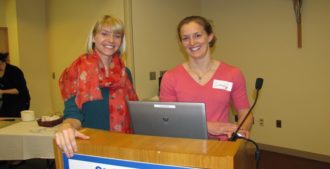
“I have always desired to keep learning. The field of endocrinology has always fascinated me. In 2000, I decided to pursue studies of menstrual cycle disorders. I wanted to address social determinants of health and preventable diseases and thus decided to specialize in obesity medicine, so I pursued my credentials as an obesity medicine specialist in 2016,” said Dr. González.
Over the past two years, she became a Harvard Macy Institute Scholar and decided to create an IPEC competency program at Newton Pediatrics, with the goal of promoting teamwork and team-based learning, improving patient-centered communication and patient care, and decreasing burn-out. All members of the practice, clinicians and non-clinicians, gather weekly to teach each other and learn from each other using case venues and peer reviewed journal articles to facilitate discussion.
Since she completed her pediatric residency more than 20 years ago, Dr. González has continued to pursue her own education while teaching and guiding others. In addition to making tangible changes in the lives of her patients, she is grateful for the opportunity to be able to enter their lives.
“I’m very proud to empower youth so that they can be all that they are meant to be,” said Dr. González. “They see the doors of possibility and it’s a privilege to guide them to avoid risky behaviors. I know that through our work I can help prevent Type 2 diabetes and other obesity-related co-morbidities. This in turn helps decrease referrals.”
Her work with population health initiatives has been a valuable contribution to a pillar of the PPOC’s mission of delivering the highest quality patient care to children around the Commonwealth. Dr. González has been a member of the PPOC for 8 years. She loves being able to share in the learning experiences of other providers in the network, and feels that one of the largest benefits of membership in the PPOC is the networking and sense of community. “I am grateful for the other providers with whom I’ve been able to network, and the top tier Hospital with which I’m affiliated—the BCH Specialists. I’m also very happy with how quickly the PPOC can solve problems such as the cyber security issues; the transition to telehealth during COVID-19.”
Dr. González values her fellow practitioners at Newton Pediatrics, especially acknowledging colleague Dr. Krisztina Bukur-Doczy for encouraging her and supporting her interests and initiatives. “Dr. Bukur-Doczy empowers me to continue working on behalf of children through the TEEEN® program and my other projects. She’s given me great autonomy and trust to build upon the patient care I give,” she said.
“I love approaching the topic of population health from a prevention standpoint—I always have focused my work in that way—preventing Type 2 diabetes. My passion is to empower youth, teaching them to avoid risky behaviors, and teaching them that if you study hard you can go anywhere you want to go. There are endless doors that will open to them.”
Dr. González is the recipient of several awards for her work including:
- Certificate of Recognition at the 5th Annual World Congress on Insulin Resistance Syndrome for research poster on the TEEEN® program, 2007
- Boston Business Journal Champion in Health Care Award for innovative work as founder and director of TEEEN® program, 2009
- El Planeta Award in recognition for work with the Hispanic population, 2007
- Tisch College and Tufts University School of Medicine Community Service Learning Faculty Award, 2016
